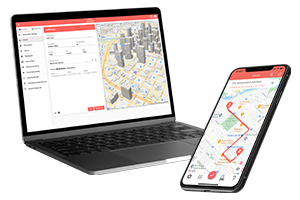Last updated on February 19, 2024
Well, strap in and hold on to your car loan payments, folks! The world of vehicle expenses can sometimes feel like a wild ride through a rush-hour traffic jam, but never fear. We’re here to help you navigate the fast lane to understanding your car ownership expenses.

Standard Mileage Deduction Vs. Actual Expenses Method: The Great Debate
So you’re a hard-grafting entrepreneur, a bustling gig worker, or an industrious freelancer. You’ve got your car running all day, zipping from A to B and sometimes even visiting Z. Now, here’s the twist. There are two different roads you can take when it comes to handling your vehicle expenses for tax purposes.
On one hand, there’s the standard mileage deduction. This one’s as straightforward as a drag race on a clear day. You simply keep track of your miles and multiply by the IRS standard mileage rate. Easy peasy lemon squeezy.
On the other hand, there’s the actual expenses method. This one is more like maneuvering through a treacherous mountain pass. You’ll need to keep track of vehicle insurance costs, fuel expenses for vehicles, vehicle maintenance costs, vehicle repair costs, car registration and taxes, and even the dreaded depreciation of vehicle value. Phew! Makes your head spin faster than wheels on a freshly-oiled axle, doesn’t it?
How To Tackle Yearly Car Expenses on Your Schedule C (Form 1040)
If you’re a self-employed maverick, the Schedule C (Form 1040) is your trusty co-driver in this vehicle expense journey. You might be thinking, “Is this where I document my car loan payments? Or my routine car service expenses?” Indeed, it is!
Section II, line 9 is your go-to spot for car and truck expenses. You’ve got two options here: the standard mileage deduction or the actual expenses method. Remember, you’re in the driver’s seat. Choose the path that offers you the biggest tax savings, whether that means staying on the straight and narrow with standard mileage or taking the scenic route with actual expenses.
Understanding Depreciation and Limits for Business Vehicle Expenses
When it comes to maximizing your business vehicle deductions, understanding depreciation and applicable limits is crucial. Depreciation allows you to deduct the cost of your vehicle over its useful life, recognizing the wear and tear it undergoes through business use. Let’s dive into the essentials, peppered with FAQs to clarify common confusions.
What is Depreciation?
Depreciation is the process of deducting the cost of your business vehicle over several years. It’s based on the idea that assets like vehicles lose value over time due to usage and age. The IRS sets specific rules on how you can calculate depreciation, which depends on the type of vehicle and its use.
How to Calculate Depreciation?
There are a few methods to calculate depreciation, but the Modified Accelerated Cost Recovery System (MACRS) is commonly used for vehicles. This method spreads the cost of your vehicle over a set number of years, offering larger deductions in the early years of ownership.
Lists of Limits
The IRS sets annual depreciation limits for passenger vehicles. These limits cap the amount you can deduct each year, adjusting for inflation and market changes.
For the most accurate and official information on depreciation limits for vehicles for the years 2023 and 2024, you should refer directly to the IRS’s publications and announcements:
For 2023, the IRS publication detailing depreciation limits can be found in Revenue Procedure 2023-14. You can access it via the IRS website: IRS Rev. Proc. 2023-14 for 2023.
For 2024, the specific details regarding depreciation limits will be outlined in a similar IRS publication or revenue procedure for that year
FAQs
Q: Can I deduct the full cost of my vehicle in the first year?
A: Yes, under certain circumstances, using the Section 179 deduction or bonus depreciation, you can deduct a significant portion or even the full cost in the first year. However, there are specific eligibility requirements and limits.
Q: Does depreciation apply to leased vehicles?
A: No, you cannot depreciate leased vehicles. Instead, you can deduct the lease payments as a business expense, subject to certain limits and inclusion amounts.
Q: What if my vehicle depreciation exceeds the limits?
A: Any excess depreciation not deductible in the current year can be carried over to the next year, subject to the same limits.
Engaging with the nuances of depreciation and understanding the limits set by the IRS can significantly affect your tax deductions. Always keep abreast of the latest tax laws and consider consulting a tax professional to maximize your vehicle expense deductions effectively.
Navigating Ownership Considerations for Business Vehicles

Choosing between owning and leasing a business vehicle is a significant decision with far-reaching tax implications. This guide aims to demystify the process, ensuring you’re equipped with the knowledge to make the best choice for your business needs.
Benefits of Owning a Business Vehicle
- Depreciation Deductions: Owning a vehicle allows you to claim depreciation, reducing taxable income over the vehicle’s useful life.
- Capital Asset: A purchased vehicle becomes a business asset, potentially increasing your business’s equity.
- Flexibility: Ownership provides more flexibility in terms of vehicle modification and usage without lease restrictions.
Benefits of Leasing a Business Vehicle
- Lower Initial Costs: Leasing often requires a lower initial outlay compared to buying, freeing up cash for other business uses.
- Tax Deductions: Lease payments can be deducted as a business expense, offering immediate tax benefits.
- Newer Models: Leasing makes it easier to upgrade to newer vehicle models every few years, ensuring your business benefits from the latest technology and efficiency.
FAQs
Q: What’s better for tax purposes, buying or leasing?
A: The best option depends on your business’s specific financial situation. Leasing can offer more immediate tax deductions, while buying provides long-term benefits through depreciation.
Q: Can I switch from leasing to owning the same vehicle?
A: Yes, many lease agreements offer a buyout option at the end of the lease term, allowing you to purchase the vehicle.
Q: Are there any restrictions on selling a business vehicle?
A: If you’ve claimed depreciation on a vehicle, there may be tax implications if you sell it for more than its depreciated value, known as recapture tax.
In conclusion, whether you decide to buy or lease will hinge on your business’s current financial status, tax planning strategy, and long-term needs. Carefully weigh the pros and cons of each option and consider seeking advice from a financial advisor to tailor the decision to your unique business circumstances.
Mastering Record-Keeping for Vehicle Expenses
Keeping accurate records of your vehicle expenses is vital for maximizing tax deductions and staying compliant with IRS regulations and requirements. Let’s break down what you need to know in an engaging and informative way, complete with FAQs to tackle common queries.
What Records Should You Keep?
- Mileage Log: Document the date, mileage, purpose, and destination of each trip. This log is crucial for distinguishing between business and personal use.
- Receipts and Invoices: Keep all receipts related to vehicle expenses, including fuel, repairs, insurance, and registration fees.
- Lease or Purchase Documents: Retain a copy of your lease agreement or purchase documents for your vehicle.
Tips for Effective Record-Keeping
- Use a Digital App: Several apps are designed for tracking mileage and expenses, simplifying record-keeping and ensuring accuracy.
- Regular Updates: Update your records frequently to avoid the year-end rush and ensure nothing gets forgotten.
- Separate Business from Personal: Use separate credit cards and bank accounts for business and personal expenses to simplify tracking and reporting.
FAQs
Q: How long should I keep vehicle expense records?
A: The IRS recommends keeping records for at least three years from the date you file your income tax return.
Q: Can I claim both mileage and actual expenses?
A: No, you must choose between deducting actual vehicle expenses or using the standard mileage rate. You cannot use both methods for the same vehicle in the same tax year.
Q: What if I use my vehicle for both personal and business purposes?
A: You can only deduct expenses related to the business use of your vehicle. A detailed mileage log will help you determine the percentage of business use.
Embracing thorough and consistent record-keeping practices for your vehicle expenses not only simplifies tax time but also maximizes your eligible deductions. Start today to make the next tax season a breeze!
Why MileageWise Is Your Best Bet for Juggling Vehicle Expenses
Let’s face it, keeping track of vehicle running costs and yearly car expenses can be as complicated as rebuilding a carburetor. But there’s a silver lining. Drumroll, please. Enter MileageWise.
MileageWise functions as your reliable support team in the grand prix of vehicle expenses. The value of its expense tracker and mileage tracker features are tantamount to striking gold in the minefield of car expenses, by make and model comparisons.
Its foolproof system ensures you keep track of every single mile driven and every penny spent, so you can effortlessly sail through tax season. No more missing out on deductions because you forgot to document your tire replacement costs or miscounted your mileage.
With MileageWise, it’s save on vehicle expenses all the way. By providing a comprehensive view of your costs of owning a car and making it easy to compare the benefits of the standard mileage deduction versus the actual expenses method, MileageWise is your co-pilot to a smooth and profitable tax season.
In the wild ride of life, vehicle expenses are just one of the bumps in the road. With a dash of knowledge, a sprinkle of savvy, and the right tools at your disposal (aahem, MileageWise), you can turn those bumps into stepping stones to financial success.
Hidden Costs of Owning a Car Uncovered with MileageWise
Don’t let the hidden costs of owning a car give you a sneaky sucker punch. With MileageWise’s intuitive interface, these costs are thrust into the spotlight, ready for you to scrutinize, categorize, and deduct. Tire replacement costs? Check! Vehicle repair costs? Double check!
Navigating the Breakdown of Vehicle Expenses
Embarking on the journey of handling vehicle expenses might seem daunting. You might feel like a first-time driver, gripping the wheel nervously, constantly checking the mirrors, unsure of the road rules. But just like learning to drive, understanding the intricacies of vehicle expenses is a skill that can be mastered with time, patience, and the right guidance.
Remember, whether you’re taking the well-trodden path of the standard mileage deduction or veering into the detailed terrain of the actual expenses method, you’re in control. And with the trusty MileageWise by your side, you’ll be ready to conquer any vehicle expenses challenge that comes your way.
So, rev your engine, adjust your rearview mirror, and hit the road to financial success. After all, as they say in the motoring world, The car in front is always a Toyota. But with MileageWise, you can always be in the driver’s seat, cruising towards a smoother tax season. Drive on, entrepreneurs, gig workers, and freelancers. Your destination: optimal tax deductions. Happy travels!
That’s the long and short of it, folks. Now, buckle up, keep your eyes on the road, and your hand upon the wheel. It’s time to make your vehicle expenses work for you, rather than the other way round. After all, who wouldn’t prefer a ride in the smooth lane of tax deductions?



